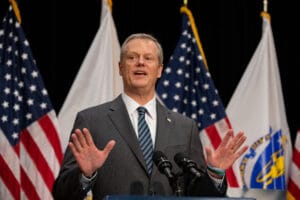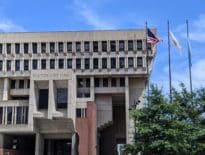
Gov. Charlie Baker speaks to reporters at the State House on June 24, 2020. Photo By Sam Doran/State House News Service
Gov. Charlie Baker “would want to try to be helpful” to the city of Boston as its leaders seek state approval to restrict fossil fuels in new buildings and major renovations, even though he continues to air concerns that the strategy could further strain the housing market.
Revisiting points he made leading up to and when he signed a major clean energy bill last week, Baker said Thursday he worries a section of the new law allowing 10 municipalities to limit the use of fossil fuels in their building sectors will allow local leaders “to just choose not to build any housing.”
Boston Mayor Michelle Wu announced Tuesday that she wants the Hub to get in the mix, too, a significant development that could fold the state’s largest city into what lawmakers designed as a pilot program. Her administration has pledged to work with real estate groups when it comes time to craft the city’s specific restrictions and state officials at the Department of Energy Resources are also expected to write their own regulations governing, among other things, which projects still in the design stage get exempted.
“I understand why she wants to get in and I know her motives on this one are what I would describe as appropriate,” Baker said during an interview on GBH’s Boston Public Radio. “But my big worry here is that before we even figure out on a pilot – we’re already heading down the road that the legislature promised me they weren’t going to do, which is just open this door up and basically say anybody who wants to come in through this door can.”
The Republican governor said he gets “very nervous if we don’t even bother to figure out what we can do with this fossil fuel ban and see what it does do to housing and housing production and housing costs.”
But asked if that means he would not support adding Boston to the list of cities and towns empowered to restrict fossil fuels in construction, Baker kept the idea in play.
“If she actually can meet the test and all the rest, I know why she wants to get into this,” he said, referring to criteria in the law. “It’s one of the most expensive housing markets among urban communities in the country, so I do worry a little bit about that, and I have to see what it says. But I understand where she’s coming from and would want to try to be helpful on this.”
Baker tacked on an additional compliment for the first-term mayor, too, based on their work ahead of an impending 30-day Orange Line shutdown.
“I will say this: she and her team have been terrific partners on a lot of this stuff around the Orange Line. They’ve been great,” Baker said.
Before he ultimately decided to sign the clean energy bill into law, Baker told reporters the section allowing 10 municipalities to restrict or prohibit fossil fuel use in most construction or major renovation projects gave him “agita.”
It’s not yet clear whether Boston will win state approval to limit fossil fuels in its building sector or what form that would take. Wu said she planned to file a home rule petition, which will link the proposal’s fate to a bill on Beacon Hill.
The wide-ranging climate legislation seeks to accelerate a transition to renewable energy sources and implement strategies to achieve the state’s goal of net-zero emissions by 2050, including by eliminating the offshore wind price cap and overhauling how the state connects to power generated by turbines off its coast.






